DCP Warehouse Blues Series
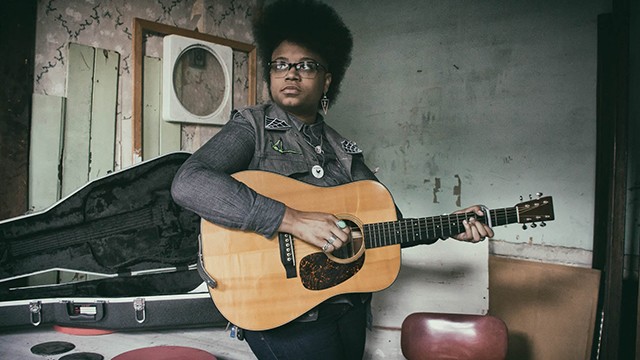
The Blues is a musical art form almost ancient in its roots and yet timeless in its burden. A bewitching musical undertow emergent from the deep south “juke joints” of post-emancipation America, it is an art whose mythos dances lasciviously between themes of love, lust, hoodoo, and just plain evil. While there are stylistic variations in blues music by region (from the Mississippi Delta Blues to North Carolina’s own Piedmont Blues), the lyrical substance overwhelmingly follows one overarching theme: the bad side of love. The low-down, cheating, messin’ around side of love.
Son House, the legendary blues guitarist and songwriter, famously said, “Ain’t but one kind of blues, and that consists between a man and a woman that’s in love.” At some point in every person’s life, they will know what it feels like to be on the wrong side of love. And like most relationships, there’s the man’s side of things and then there’s the woman’s. The most infamous blues artists have historically been men the likes of BB King, Muddy Waters, and John Lee Hooker. But the truth is that if you’re only listening to what the men have to say, then you’re only getting half the story.
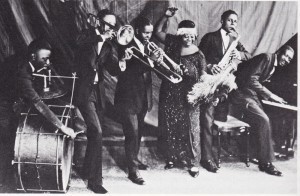
Two decades later, the first blues music to be recorded was sung by women with small jazz ensembles or piano accompaniment. In August of 1920, a young jazz singer from Harlem named Mamie Smith became the first black woman to record the blues with her song “Crazy Blues,” from Okeh records. Within a month of its release, the record had sold over 75,000 copies – an astounding figure considering the expense of phonographs at the time. This was the spark that would trigger massive changes in popular music and culture for decades to come. With such widespread dissemination, blues music quickly became a national craze, and before the end of 1921 record studios had scouted and recorded hundreds of black female artists. Their search led them, inevitably, back to Ma Rainey and her traveling show.
In the decades since Ma Rainey had first incorporated the blues into her stage act, several singers had followed in her footsteps. A protégé of Rainey’s by the name of Bessie Smith (no relation to Mamie), was picked up by Columbia Records and rose from this tent circuit to become the highest-paid black artist of the 1920s. With the vast distribution of her library of over 160 recordings, Bessie Smith became one of the most influential singers of all time and is remembered as the “Empress of the Blues.” Her booming, hot-blooded wail was the prototype, the model which would define the very soul of the blues.
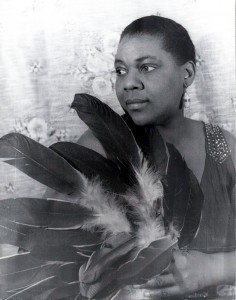
These classic female blues singers were pioneers in the record industry, among not only the first blues artists but also the first black artists or female artists to be recorded. With unique vocal stylings full of dramatic wails and shouts, these women effected popular music from jazz to gospel and eventually rock & roll. They inspired musicians – both female and male – for generations to come, a ripple which can be seen in such legendary artists as Aretha Franklin, Janis Joplin, Jimmy Page, and the Alabama Shakes’ Brittany Howard. These women set the mold, and were able to prove to the world, in 12 bars, that they were fully capable of sustaining their own independence. “I’ve got a disposition and a way of my own,” Ida Cox sings. “Go home and put my man out if he don’t act right. Wild women don’t worry, wild women don’t have the blues.”
July 8th kicks off the 13th annual Warehouse Blues Series at Durham Central Park. The series consists of four Fridays of live blues concerts, food trucks, and dancing. The theme of the series changes on a yearly basis (last year it was blues harmonica, the year before that it was slide guitar). This year, they continue the important tradition of female-led blues acts by highlighting the women of the blues. All of the four acts are fronted by strong women, each of whom has a unique slant on what it means to sing the blues.
Warehouse Blues Series Lineup
Friday, July 8, 5:30-7:30 pm
Amythyst Kiah & Her Chest of Glass

Friday, July 15, 5:30-7:30 pm
Rissi Palmer and Powerhouse Blues Vocal Workshop
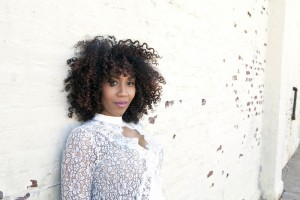
Friday, July 22, 5:30-7:30 pm
Kamara Thomas & The Nightdrivers Tribute to Blues Women
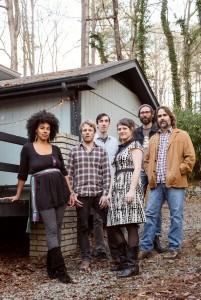
Kamara has been a resident of Durham since 2013, where she enjoys our own local brand of creativity. During the Warehouse Blues Series, Kamara will perform with her band, The Night Drivers, where she will pay tribute to her favorite female blues artists by interpreting some of their songs. Before the performance, Terri Robbins, the Vice President of National Women in Blues will give a mini-lecture about the crucial role of women in the blues.
Friday, July 29, 5:30-7:30 pm
Samantha Fish

All shows are free and open to the public.
The Warehouse Blues Series is now in its 13th year, and has been organized for the last three years by Tess Mangum Ocaña, who also organizes acts for the Art of Cool Fest and her own Sonic Pie Productions. When I asked Tess about her inspiration for this year’s theme, she simply told me, “I’m really into Woman Power.” Tess was inspired to feature the women of blues by her grandmother, who was a well-known guitar player and tutor for around 70 years, even giving lessons to a young Randy Travis.
Tess always wanted to be involved in music but not necessarily as a musician. She wanted to be on the side of empowering musicians by providing them with opportunities. This is what the “Woman-Powered” Warehouse Blues Series is all about, championing the blues as an empowering outlet of expression with a rich history and a promising future. “I think that there is a definite future for the blues as a genre,” Rissi Palmer believes. “I think as long as people want to feel deeply from the music they listen to, the blues will live. I think it remains relevant in the way it takes on different forms.” The acts in this year’s series demonstrate the endurance of the blues in popular culture by showcasing its variations through time and region, and its importance as a vocal narrative of American feminism.
The blues is the blues is the blues, as they say. And whether it comes from a man or a woman, its subject matter is as universal as its chord structure. Perhaps the reason it has endured for so long is because of this universality, that it is so widely relatable. The blues is raw musical emotion, with a soul that decries strength in the face of adversity. It’s a simple genre that takes a lifetime of heartache to truly appreciate.
[Originally published in the Triangle Downtowner Magazine]

